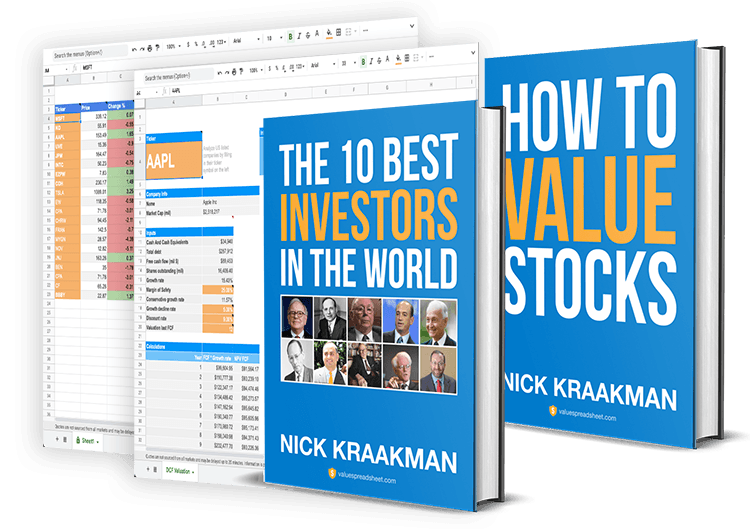Transcript
Hello, everyone, thank you all so much for tuning in again.
This is the final episode, episode 20 of the Value Investing Bootcamp podcast.
I'm your host, Nick Kraakman, and yeah, I just want to thank everyone who has listened to all the episodes, or even if this is just the first episode that you're listening to, be sure to go back and check out all the other ones, because we covered a lot of information.
We covered almost every aspect related to value investing, so be sure to check it out.
I tried to give you as much information as possible, as much of my knowledge that I have gathered over the years, and for this final episode I would like to focus on how to profit from hype and pessimism.
Because we've seen in earlier lessons that value investors, what they essentially do, is trying to find great companies selling at discount prices, and these discount prices often occur because of pessimism, general lack of trust in a certain company, often for irrational reasons, or temporary reasons, which can be easily solved.
Value investors greatly profit from this, and so they try to purchase when the pessimism is at its height.
Warren Buffett said “Buy when there is blood in the streets.”
Well, you don't have to wait till it’s that severe, but it just gives you a feeling that you should really-- If everyone else is thinking that something is a really bad investment, it does not necessarily mean that it is a bad investment.
You just have to pay close attention to the details, look at the financial statements, see what they're actually earning, how they're actually performing, and base your decisions on that, and not on other people's opinions.
Always think for yourself, don't rely on others to do the work for you, because in the end, everyone is trying to make a living in this world.
For example, the analysts, they make predictions about how well a company will perform, however, they are doing it in their own best interest, they are trying to sell.
They're working, for example, for a bank, for a broker, they put out predictions and hope that people will trade, make more frequent trades, so they earn more fees.
You know, so you just can't rely on other people's information, because you never know what their incentives are.
So, always do your own due diligence and your own research.
The father of value investing, Benjamin Graham, who was also Warren Buffett's mentor, came up with a nice metaphor for the stock market.
He called this guy, this fictitious guy, Mr. Market, and the story, is as follows:
There is a guy called Mr. Market, and every day he comes to your house, and he pitches stock prices to you.
He says, for example, IBM $200, Google $500, and the thing is, you don't have to act on this.
He comes back to your house every single day, it doesn't matter to him, it doesn't matter to Mr. Market, what you decide to do.
You have the opportunity to buy, sell, or do nothing at the price that he offers you.
And that's the beauty; he will be coming back to you every single day.
The thing is, Mr. Market, he pitches these opportunities, these stock prices to you, but he is a manic depressive guy.
It's very sad, of course, but the thing is that sometimes he gets manic and very enthusiastic, and that's when he quotes ridiculously high prices, and sometimes he's in a bad mood, he is pessimistic, he is gloomy and doesn't see anything except negative news, and that's when he quotes ridiculously low prices.
And whenever he quotes these ridiculously low prices is when you should enter the market, buy stocks, and wait till he becomes manic again, and sell when he is in the hyped up mode, and sell for incredibly high prices.
So, that's the Mr. Market metaphor of Benjamin Graham, and it still applies in today's world, because that's exactly how the market works.
The market prices are determined by investors who act based on often emotional decisions rather than rational decisions, which can create incredibly high and incredibly low stock prices which have no relation to the intrinsic value anymore.
And this difference between price and value is exactly what value investors try to exploit.
And the beauty is that, like I said, he pitches you these offers, but you don't have to swing at every pitch.
You can stand still and wait until finally a great offer is being made by Mr. Market.
For example, Charlie Munger, again, Warren Buffett's business partner, once said that he didn't get to where he was by investing in mediocre opportunities.
He said it takes character to sit on a pile of cash and do nothing, but that is exactly what you should do.
Sit on your cash if there is no good opportunity available at the moment.
Just don't become Mr. Market yourself.
Don't become manically depressed when it comes to investing.
Don't get caught up in the hype and the pessimism that is often, you know, sort of fed to you by the news and by analysts and news reporters.
I mean, they all sort of tend to get caught up in this herd behavior, where everyone is running to the exit, and where everyone wants to get in at the same time.
This really pushes prices to insane, irrational levels.
And you shouldn't--I mean, John Templeton, another amazing investor, legendary investor, he once said that “If you want to have a better performance than the crowd, you have to do things differently from the crowd.”
And it's not always easy to go against the crowd, go against what everyone else is doing, but as a value investor, if you want to earn above average returns, that is what you more often than not have to do.
Because these hypes can create these financial bubbles, which are very, very dangerous, because they burst at some point, and then a lot of people lose all their money.
So, in order to stay away from that, you need a solid strategy.
In order to protect yourself against this hype on the stock market, this irrational behavior, you need a solid strategy and stick to it and apply it consistently.
That is how the greatest investors in the world do it, and that's how you should be doing it.
And, yeah, like I said, in these past 20 episodes in total I've tried to convey to you the strategy that all the great investors in the world use: value investing.
And I hope you learned a thing or two from it, which I guess you did because otherwise you wouldn't be listening to this 20th episode right now ;-)
I just wanted to say for the final time, thanks a lot for listening, for all your support, for all your questions and comments and reviews.
I really, really appreciate that.
I appreciate all the time that you spend with me on this podcast.
If you want to learn more about value investing, if you really want to go in depth and get all the ins and outs, including spreadsheets, checklists, etc, then I created the Value Investing Bootcamp video course, which includes all my knowledge jam packed into this one course.
It goes from A to Z.
So, we start at the beginning, what is value investing, but we end with advanced tactics that hardly anyone ever talks about.
So, it's for both the beginning investor, as well as the experienced investor.
Especially if you've listened to this podcast, I can imagine that you still have some questions, and I'm sure they will all be answered in the video course.
So, do check it out.
I put all my blood, sweat, and tears into that course over the past couple of months, and it really paid off.
I mean, a lot of people have already registered and enrolled and are enjoying the course already.
I've got a lot of positive feedback, so check it out.
You can go to ValueInvestingBootcamp.com to get more information.
So, final thanks to you for listening, and I hope you enjoyed the show.
It was a pleasure and I hope to see you on the course.
If you enjoyed today's show, head over to ValueInvestingBootcamp.com to find out more on how you can invest like the pros, manage your own portfolio with confidence, and consistently earn mind boggling returns on the stock market.
Learn more about value investing



